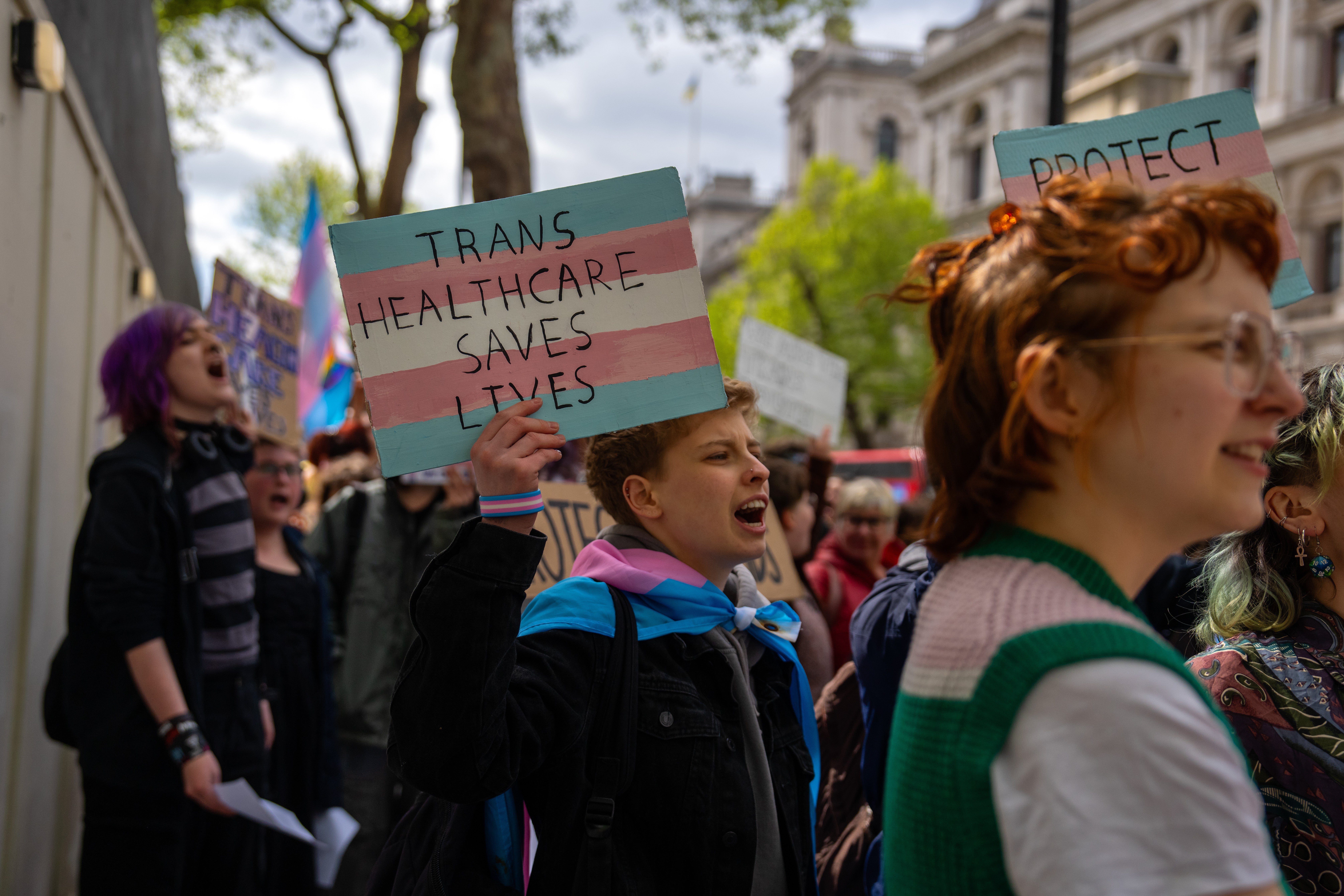
Transgender men and women are increasingly having crucial hormone treatment withdrawn by NHS doctors, an investigation has found.
Trans patients and staff at NHS gender services have said that cases of people being refused hormone replacement therapy (HRT) or having the medication withdrawn are on the rise.
HRT is a crucial part of the transition process for many trans people and involves the administration of hormones to align a person’s physical characteristics with their gender identity.
Sources within gender services and primary care point to lack of funding, uncertainty from GPs about whether they can prescribe the treatment, and the Cass Review as factors in the trend. One GP said that, even though the Cass Review looked at children’s care, the recommendations about exercising caution in providing hormones have had a knock-on impact on adult services, with practitioners “genuinely scared” about doing something wrong.
An investigation by The Bureau of Investigative Journalism, published in partnership with The Independent, spoke to adult trans patients as well as NHS staff about the issue.
Hormones withdrawn
The text message Emily* received from her GP practice was life-changing. Emily, who is transgender, was first prescribed hormone replacement therapy two years ago. It had enabled her life to feel “ordinary”. Suddenly her prescription had been stopped.
The message explained that the GP practice was unable to “safely support ongoing prescribing or monitoring” of the “specialist drug”. If Emily wanted a new prescription, she would have to go private – a cost she could not afford.
The Bureau of Investigative Journalism has spoken to a number of transgender people who, like Emily, have had their HRT refused or withdrawn.
This had happened even when the prescription had been recommended by a specialist – and in some cases after having received the treatment for years.
Similar experiences shared on online forums suggested these were not isolated incidents, the investigation found.
There is no official data on a national level that shows the number of transgender people who have their prescriptions withdrawn. However, staff at multiple NHS gender services have said that the issue of care withdrawal has become more frequent in the past year.
While HRT is best known for its use in treating symptoms of the menopause, it is a crucial part of the transition process for many trans people.
For trans women this will typically involve taking oestrogen and anti-androgens, and for trans men taking testosterone.
Oestrogen can promote breast growth and the redistribution of body fat. Anti-androgens help suppress male sexual characteristics. Testosterone increases muscle mass and promotes the development of a deeper voice and facial hair growth.
Some of the effects of hormone therapy are irreversible, but coming off HRT can cause withdrawal symptoms and changes to a person’s weight and skin. It is a lifelong treatment.
Of those who had their HRT refused or withdrawn, some were told their GP didn’t feel qualified to provide the care. Other GPs didn’t provide the treatment on the grounds they don’t have the resources to provide it.
Others, in their responses to a survey by Transactual, a trans-led research group, said their GPs had cited lack of policy or personal beliefs as reasons why they had withdrawn or refused their HRT prescriptions.
The issue appears to reflect a wider rollback of access to gender-affirming healthcare in the wake of April’s publication of the controversial Cass Review into health services for trans young people.
The Cass Review, which was an independent review of gender identity services for children and young people in the NHS, said that for the majority of young people a medical pathway “may not be the best way to manage their gender-related distress”. It recommended extreme caution in providing hormones for anyone under the age of 18.
It also found that knowledge about the long-term health impacts of hormone interventions on young people was limited and the issues needed to be better understood.
Following the review, the government banned the prescription of puberty-suppressing hormones to under 18s.
NHS England also announced a review into the operation of adult gender dysphoria clinics.
‘I’m in limbo’
In 2021, Emily received a diagnosis of gender dysphoria – the distress or unease felt by a person when there is a mismatch between their gender identity and the sex they were assigned at birth. To avoid a lengthy wait for an NHS gender clinic appointment, which can take years, she opted for a private gender service.
She was prescribed HRT by her GP until this summer when this suddenly changed without consultation. She was informed by text message that the medication would be stopped, leaving her in limbo.
She explained: “My mental health has been in such a precarious position because of the struggle to get healthcare.”
Elijah, 33, also used a private service to avoid waiting for an NHS clinic. He waited six months for an appointment and paid a fee before receiving a gender dysphoria diagnosis.
The testosterone he was prescribed after this diagnosis had made him feel confident, grounded and happier. His GP had been so supportive that he hadn’t imagined losing access to it. But, after he moved house and registered with a different practice, his new doctor decided to discontinue the prescription he had been receiving for two years.
“I found it so paralysing that she had made that decision for me,” said Elijah. “I had no say, despite having proof that everything had been fine for the last two years.
“My mental health was terrible because I was so stressed about the implications of being off something that had totally changed my life.
“You’re trying to do your life, trying to work … it’s totally destabilising.”
The inaccessibility of gender-affirming care has driven some people to resort to drugs bought online from unregulated sources or shared within their community.
“There’s a reason why so many people don’t go through the system,” said Elijah. “Some of that is to do with wait times and more of that is to do with bad experiences and having to have awful conversations with medical practitioners.”
Emily added: “It’s important to say that even for trans people who do have access to healthcare they don’t necessarily get the care they want or would prefer, but you kind of just have to go along with it.”

Wider rollback
Kamilla Kamaruddin, who has been a GP for two decades and is currently a lead clinician at the East of England Gender Service, said that the issue of care being refused or withdrawn from transgender people has become more frequent.
“GPs who refuse to prescribe are still in the minority but we’re seeing more and more GPs who are refusing to prescribe on the basis that they don’t have the expertise ... even though they have already done the prescribing for a very long time,” she said.
“If a GP didn’t know how to treat a heart condition they’d ask a cardiologist – they’d get advice and guidance … for some GPs this doesn’t seem to apply to treating trans people.”
The General Medical Council, the regulator of doctors in the UK, has previously stated to GPs that the provision of HRT prescriptions to transgender adults is not a highly specialist area and does not require specific expertise.
Staff at other NHS gender services also said HRT withdrawal has become more frequent in the past year.
NHS England says that decisions are made locally and that GPs should cooperate with gender identity clinics in the initiation and ongoing prescribing of hormone therapy.
While the NHS does not record each time a GP withdraws a person’s medication, one service in Manchester has data that demonstrates the trend in their area.
At Manchester’s Indigo Gender Service in 2022-23, eight per cent of its HRT requests were refused by GPs. This has risen to 11 per cent in 2023-24.
Tavistock and Portman, the UK’s largest gender identity clinic, said refusals to prescribe HRT were a “frequent occurrence” but it was not able to provide data.
The Gender Identity Service in Leeds also said it had experienced an increased number of GP practices that were unable to begin or continue prescribing HRT.

A systemic issue
One reason cited, both to patients and to services, by GPs who have declined to provide care for their transgender patients is a lack of funding.
Prescriptions for mental health conditions and eating disorders have reportedly been cancelled by GPs in response to a lack of funding. GPs in Dorset said they would decline requests from specialist services, including those relating to gender dysphoria.
Sources working within gender services and primary care also said that the Cass Review, and the response of the Royal College of General Practitioners (RCGP), have contributed to HRT prescriptions being refused or withdrawn.
The RCGP updated its official position on transgender care in April in response to the Cass Review. It stated that GPs should “work with the gender services in the same way as with any other specialist” and called for the ongoing care of transgender people to be adequately funded.
However, it also said that the RCGP would support GPs who felt their workload prevented them from providing such care for transgender patients. Six months later the RCGP updated this statement again – removing the sentence that supported individuals refusing care due to their workload and clarifying that the statement was not meant to apply to patients who already had established HRT prescriptions.
A spokesperson for the RCGP said: “The care of transgender and gender questioning people is a complex area of medicine and the RCGP has members with widely diverging views on the issue.”
It added that its position statement had been “rapidly” updated in response to the Cass Review. After reviewing feedback it had received following this update, it made some clarifications and “minor edits”.
“The college remains strongly committed to the improvement of services for patients with gender incongruence,” the spokesperson said.
The British Medical Association, the doctors’ trade union, said: “Overstretched practices continue to do a considerable amount of work that is not commissioned by the NHS but should be. Many GPs are not trained to provide the specialist care these patients need and therefore fear risking patient safety.”
Duncan, a GP for Sussex Gender Service, an NHS adult gender service pilot scheme, said: “The Cass Review made recommendations for people up to the age of 25, even though it was a review of children’s [gender] services. I think those issues have confused the picture somewhat and I think GPs are genuinely scared that they’re being asked to do something that might potentially be breaking the law.
“[Some staff] don’t care about our community and they can get away with it because they’re emboldened by the rhetoric in society and politics. And I think part of it to be fair to them is that they are beleaguered, they are already overstretched.
“I do feel for GPs in those areas who must be caught between a bit of a rock and a hard place but, at the end of the day, it’s their patients who are trapped in the middle here and it just seems like the whole system has lost sight of that.”
*This name has been changed on request of the individual concerned







